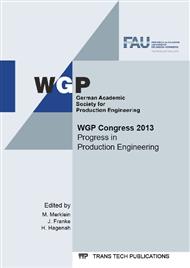p.245
p.255
p.263
p.271
p.278
p.285
p.293
p.303
p.311
Approach to Forecast Energy Consumption of Machine Tools within the Design Phase
Abstract:
For environmental and economic reasons, energy- and resource- efficient operations of cutting machines are increasingly important. The determination of properties and functions of machine tools, which affect future energy consumption in operation, essentially takes place within the design phase by combining required components. Therefore, it is necessary to develop approaches to find an efficient optimum between energy consumption, productivity, acquisition costs and operating costs within the design phase of a machine tool. However, the energy consumption of a machine tool depends on the application scenario. In addition to that, it is difficult to forecast the energy consumption of several components because of their mutual interaction. Existing approaches to forecast the energy consumption of a machine tool within design phase are based on complex simulation or mathematical models which are difficult to parameterize for the design of a machine tool and thus, for the comparison of various configuration alternatives. An alternative for forecasting energy consumption is the use of empirical information. That information can be acquired by measuring the energy consumption of machine tools in operating production systems. This paper presents an approach to forecast the energy consumption of machine tools within the design phase, which will be developed by the Institute of Production Engineering and Machine Tools. It will be based on the data feedback (empirical information) from a machine tool operating in an existing manufacturing system. For this purpose, a logger module will be developed, which continually captures the energy consumption by means of the machine integrated sensors. That information will be sent back to an energy navigator module, which processes that information in order to forecast the energy consumption of a new designed machine tool. Also, the lifecycle costs will be calculated in order to rate cost and benefits of each machines lifecycle in terms of energy consumption.
Info:
Periodical:
Pages:
278-284
DOI:
Citation:
Online since:
September 2013
Authors:
Keywords:
Price:
Сopyright:
© 2013 Trans Tech Publications Ltd. All Rights Reserved
Share:
Citation:


